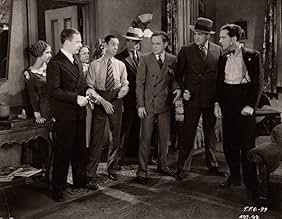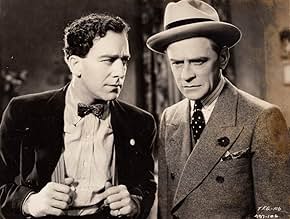When a hapless pharmacist loses his job and falls in with criminals, he's soon made The Fall Guy. Unemployed, Johnny Quinlan (Jack Mulhall) starts doing jobs for underworld chieftain Nifty H... Read allWhen a hapless pharmacist loses his job and falls in with criminals, he's soon made The Fall Guy. Unemployed, Johnny Quinlan (Jack Mulhall) starts doing jobs for underworld chieftain Nifty Herman (Thomas Jackson), who plans to use Johnny as a dupe to cover up his own shady activi... Read allWhen a hapless pharmacist loses his job and falls in with criminals, he's soon made The Fall Guy. Unemployed, Johnny Quinlan (Jack Mulhall) starts doing jobs for underworld chieftain Nifty Herman (Thomas Jackson), who plans to use Johnny as a dupe to cover up his own shady activities. Herman plants a illegal drugs on Quinlan, who is nabbed by federal agent Charles New... Read all
- Director
- Writers
- Stars
- 'Hutch'
- (uncredited)
- Panhandler
- (uncredited)
- Mrs. Bercowitz
- (uncredited)
- Director
- Writers
- All cast & crew
- Production, box office & more at IMDbPro
Featured reviews
I knew when the film began I was in for a bit of torture. Ned Sparks, a popular but occasionally annoying supporting player, was there in the first scene. Considering it was a gangster film, I was hoping he was the first victim, but no such luck. As a result, I has to watch and listen to his rather tired routine throughout the film. His deadpan sarcasm just seemed out of place and distracting here. Plus, giving him a saxophone to play (and play very badly) made his one of the more annoying supporting roles of the era.
Aside from Sparks, the rest of the film is just okay--nothing particularly special. It's all about an out of work and incredibly stupid man who decides the smart way out of debt is to be a "bag man" for the mob. Surprise, surprise, all does NOT go well and this leads to a decent showdown scene at the end. However, the stilted nature and talkiness of the film, something relatively common for 1930, was obvious. Not a great film, but a decent time-passer.
The rôle of Johnny Quinlan, which was played on the stage by Ernest Truex, is entrusted to Jack Mulhall, who gives a better account of himself than he has done in other talking films. His performance, however, is not comparable with that of Mr. Truex. Thomas Jackson, who may be remembered for his acting of the detective in the stage version of "Broadway," appears here as the reprehensible "Nifty" Herman. Mr. Jackson's acting is not vastly different from his efforts in other rôles, but at the same time he manages to put a certain amount of life into this "Nifty" Herman.
There are moments when the players in this film talk too loudly. It is not an explosion of sound, but at the same time one feels reasonably certain that Quinlan and Dan Walsh (Mr. Sparks) would be overheard in an adjoining room. Then, too, occasionally the expressions of the persons involved would, in everyday life, cause them to be suspected of wrongdoing. Nevertheless, a spectator is apt to want to know how this story is going to end, for it is blessed with a great deal more originality than the average run of talking pictures.
In the first chapter, Johnny Quinlan, has lost his job. He does not dare to tell his wife and therefore pretends that he is employed. From Quinlan's actions, one would imagine that Bertha Quinlan would have suspected her husband of being out of work long before she does. Quinlan eventually becomes entangled with "Nifty" Herman, who craftily lends the younger man $15. Johnnie tries to steer clear of the designing "Nifty," but it chances that the latter needs somebody to take a suitcase out of his office. Quinlan is almost desperate by that time and consents to go to work for "Nifty," who expatiates upon the chances Johnnie whill have while employed by a bootlegger. Johnnie takes the suitcase, which he thinks contains alcoholic liquor and carries it to his home. Bertha notices the bag and at once insists that her husband return it immediately to "Nifty." The suspense is all the keener for having Charles Newton, head of the narcotic squad of detectives, in love with Bertha's sister. He is in the humble little flat when Quinlan, having discovered that "Nifty's" office is closed, comes back with the bag and conceals it as best he can under a rocking chair. Of course it is not long before it is discovered and poor Quinlan finds himself being interrgated by Newton, for, to his dismay, the suitcase contains a large quantity of drugs.
The ending is adroitly arranged with a surprise coming from the ignominious "Nifty." Mae Clarke is decidedly clever as Bertha. Pat O'Malley is acceptable as Newton.
Was this also supposed to be a Crime-Drama? I suppose that it possible, but as another commenter observed, that part of it does not work well in 2008. It's just funny. A bizarre criminal mastermind pretending also, for some reason, to be a different criminal mastermind pays an unemployable sap to mind a suitcase for a weekend. The sap and his wife live also with the wife's sister and brother, with the brother being an unemployable eccentric learning (badly) to lay the saxophone. (Ned Sparks steals the scene for the entire film in the role of the sax playing in-law.) I can say no more, as it would be giving away the ending of this short (65 min.) film, but the film is a comedy, not a dark comedy, and it is, again, absurd.
If you love these old movies, by all means watch it. It's a amusing and should be worth an hour of your time.
Did you know
- TriviaThe Fall Guy opened at the Eltinge 42nd Street Theater in New York City, New York, USA on 10 March 1925 and ran for 95 performances, closing in June 1925. The opening night cast included Ernest Truex as Johnnie Quinlan and Dorothy Peterson as Lottie Quinlan.
- Quotes
'Nifty' Herman: Say, why don't you come in on that proposition I spoke to you about?
Johnny Quinlan: Well, eh, you didn't tell me just exactly what it was, Nifty.
'Nifty' Herman: You should worry what it is! There's a lot of Jack in it. Come on inside and we'll gab about it.
Details
- Runtime
- 1h 6m(66 min)
- Color
- Aspect ratio
- 1.20 : 1




























